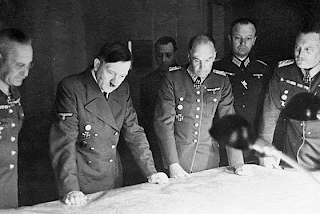
By all accounts, Nazi Germany made serious errors in waging the Second World War that kept it from achieving much greater success, though whether it could have won the War remains open to doubt, given the American effort to develop nuclear weapons. Also, Japanese mistakes need to be taken into consideration. At any rate, asking “What if” questions about German strategy can help us better understand what actually happened.
Here is a list of key German mistakes that can guide our thinking about the many lessons we can learn from this greatest of wars (not included are significant errors at the battlefield level such as at Dunkirk and Stalingrad). Of course, this list assumes that Germany’s decision to go to war in the first place and with the goals it had for doing so made sense. I thank my students for their contributions to the list.1
Economic
- Did not completely mobilize its war economy soon enough.
- Did not draft women into the economy until the 1940s.
- Starved and shot Soviet POWs instead of using them as slave labor.
- Wasted resources to destroy the Jews, who could have boosted the economy in ordinary jobs or as slave laborers.
- Diverted supplies from the Wehrmacht to the SS and other units.
Political
- Permitted endless bureaucratic infighting and duplication.
- Alienated the populations of occupied territories, especially in the USSR, where many were initially against Stalin.
Military
- Fought the Battle of Britain against high odds (a stack of contingencies: the RAF, the Royal Navy, securing a beachhead, the British army, U.S. support), yet failed to concentrate on the greatest British vulnerabilities: fighter plane production, the electrical grid, and sea lanes that could have been cut by bombers from France and Norway.
- Did not coordinate with Japan vs the USSR–for instance, by offering Japan large portions of Siberia and Central Asia if it attacked the USSR.
- Allowed Mussolini to foul things up instead of clamping down on him or removing him.
- Chose to attack the USSR instead of first driving the British out of the Mediterranean and Middle East, thus opting to fight a two-front war.
- Delayed the German attack on the USSR to handle the Balkans sideshow, yet didn’t prepare for winter.
- Put too much emphasis on north and south in the 1941 attack on the USSR, and delayed the crucial Fall offensive against Moscow to focus on Kiev.
- Did not attack Moscow and the main Soviet forces in Spring 1942.
- Underestimated Soviet resilience, defense production, and military prowess.
- Underestimated American industrial, technological, and fighting capabilities.
- Declared war on the U.S., sparing it the dilemma over Europe First vs Pacific War strategies.
- Failed to comprehend and counteract the Allies’ great superiority in intelligence and deception.
*****
Kenneth J. Dillon is an historian who writes on science, medicine, and history. See the biosketch at About Us. For further analysis of ancient and modern history, see his The Knowable Past (Washington, D.C.: Scientia Press, 2018).
